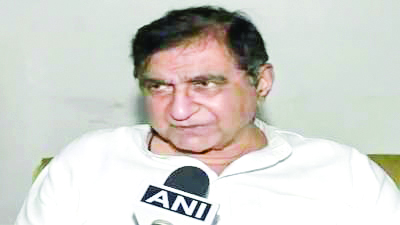Congress general secretary and Haryana in-charge, Deepak Babaria, has offered his resignation, taking moral responsibility for the party’s crushing and shocking defeat in the recent Haryana Assembly elections. The election outcome, which delivered the BJP a third consecutive term despite anti-incumbency, has left Congress grappling with internal strife and a leadership crisis.
Babaria announced on Monday that he had tendered his resignation to the party’s high command immediately after the election results were declared. “I offered to resign last week. I informed the high command that, given the results, they could replace me if they see fit. My health is also not in good condition, and I believe it is my moral duty to step down,” Babaria stated. However, the party leadership has yet to respond to his resignation offer.
The BJP’s commanding performance saw it win 48 out of 90 seats, 11 more than Congress, securing its most significant victory in the state’s history. The Congress, which had pinned its hopes on Dalit and Jat voters to revive its fortunes after a decade in opposition, was left scrambling for answers.
It is worth mentioning here that during the distribution of tickets Babria had expressed his helplessness to accommodate all the candidates who were camping in Delhi to strengthen their claims. However, the internal differences within the top party leaders during the election campaign had led to poor show by the party.
As party’s dalit face Kumari Selja remained absent from election campaign and Congress had heavily relied on its traditional vote banks—Jats, who make up 25% of Haryana’s population, and Dalits, who constitute 20%.
However, the BJP made major inroads into both communities, the saffron party’s success in eight of the 17 Scheduled Caste (SC) seats, including Nilokheri, Pataudi, Kharkhauda, Hodal, and Narwana, dealt a severe blow to the Congress.
Moreover, a significant upset occurred in Hodal, where Haryana Congress chief Udai Bhan lost to BJP’s Harinder Singh. Despite retaining nine SC seats, Congress failed to capitalize on anti-incumbency or make meaningful gains. Compared to the 2019 elections, the BJP’s performance in SC constituencies improved dramatically, marking a shift in the political landscape.
Reacting to the election outcome, Congress leader Rahul Gandhi expressed his disappointment, calling the results “unexpected.” He acknowledged that the party was conducting an internal analysis to understand the reasons behind the loss.
The loss in Haryana comes as a significant blow to the Congress, which had aimed to leverage anti-incumbency sentiments against the BJP. Instead, the saffron party’s success in securing a hat-trick victory has highlighted Congress’s organizational weaknesses and voter disconnect.
However, there was no response from the Congress high command to Babaria’s offer to resign. But his move has intensified the internal debate within the Congress over accountability and strategy. With the BJP solidifying its grip on the state, the Congress is now at a crossroads, struggling to rebuild its base and formulate a new strategy. Babaria’s potential departure, along with the demoralizing defeat, leaves the party searching for a path forward ahead of future elections.







